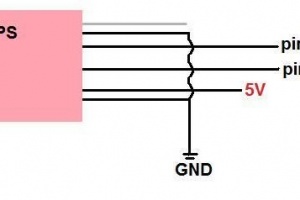Arduino: GPS first trial
Jump to navigation
Jump to search
Instalasi Library
wget https://www.monocilindro.com/wp-content/uploads/2016/03/tempo_library_v1.zip mv tempo_library_v1.zip ~/Arduino/libraries/ cd ~/Arduino/libraries/ unzip tempo_library_v1.zip
Code
#include <SoftwareSerial.h>
#include "tempo.h"
bool first_loop_exec;
unsigned long time_1=0;
unsigned long time_2=0;
#define GPS_INFO_BUFFER_SIZE 128
char GPS_info_char;
char GPS_info_buffer[GPS_INFO_BUFFER_SIZE];
unsigned int received_char;
int i; // counter
bool message_started;
SoftwareSerial mySerial_GPS(7, 8); // 7=RX, 8=TX (needed to communicate with GPS)
// REAL TIME SCHEDULER PARAMETERS AND VARIABLES
#define SCHEDULER_TIME 10000 // scheduler interrupt runs every 20000us = 20ms
#define DIVIDER_STD 200 // logging message sent every 100 scheduler times (20ms) 1s
#define DIVIDER_DELAY 500 // delay after forwarding meggages is 3s
unsigned int divider=0;
unsigned int divider_max=DIVIDER_DELAY;
// SENDS THE POLLING MESSAGE TO GPS
void scheduled_interrupt()
{
divider++;
if (divider==divider_max) {
divider=0;
divider_max=DIVIDER_STD;
time_1 = millis();
mySerial_GPS.println("$PUBX,00*33"); // data polling to the GPS
}
}
void setup() {
// Open serial communications and wait for port to open:
Serial.begin(9600);
while (!Serial) {
; // wait for serial port to connect. Needed for native USB port only
}
Serial.println("Connected");
mySerial_GPS.begin(9600);
mySerial_GPS.println("Connected");
first_loop_exec=true;
i=0;
message_started=false;
Timer1.initialize(); // initialize 10ms scheduler timer
Timer1.setPeriod(SCHEDULER_TIME); // sets the main scheduler time in microseconds (10ms in this case)
Timer1.attachInterrupt(scheduled_interrupt); // attaches the interrupt
Timer1.start(); // starts the timer
}
void loop() { // run over and over
if (first_loop_exec == true){
delay(2000);
mySerial_GPS.println(F("$PUBX,40,RMC,0,0,0,0*47")); //RMC OFF
delay(100);
mySerial_GPS.println(F("$PUBX,40,VTG,0,0,0,0*5E")); //VTG OFF
delay(100);
mySerial_GPS.println(F("$PUBX,40,GGA,0,0,0,0*5A")); //CGA OFF
delay(100);
mySerial_GPS.println(F("$PUBX,40,GSA,0,0,0,0*4E")); //GSA OFF
delay(100);
mySerial_GPS.println(F("$PUBX,40,GSV,0,0,0,0*59")); //GSV OFF
delay(100);
mySerial_GPS.println(F("$PUBX,40,GLL,0,0,0,0*5C")); //GLL OFF
delay(1000);
first_loop_exec = false;
}
// MANAGES THE CHARACTERS RECEIVED BY GPS
while (mySerial_GPS.available()) {
GPS_info_char=mySerial_GPS.read();
if (GPS_info_char == '$'){ // start of message
message_started=true;
received_char=0;
}else if (GPS_info_char == '*'){ // end of message
time_2 = millis();
Serial.print("Time,");
Serial.print(time_1);
Serial.print(",");
Serial.print(time_2);
Serial.println(",");
for (i=0; i<received_char; i++){
Serial.write(GPS_info_buffer[i]); // writes the message to the PC once it has been completely received
}
Serial.println();
message_started=false; // ready for the new message
}else if (message_started==true){ // the message is already started and I got a new character
if (received_char<=GPS_INFO_BUFFER_SIZE){ // to avoid buffer overflow
GPS_info_buffer[received_char]=GPS_info_char;
received_char++;
}else{ // resets everything (overflow happened)
message_started=false;
received_char=0;
}
}
}
while (Serial.available()) {
mySerial_GPS.write(Serial.read());
}
}
